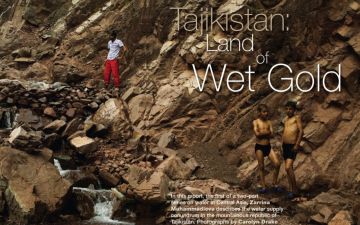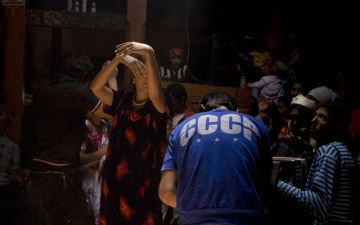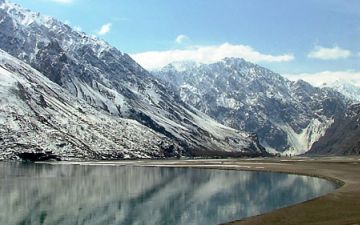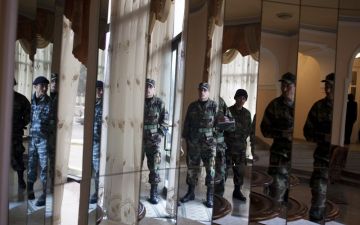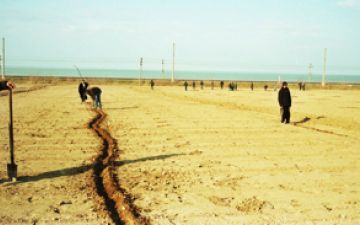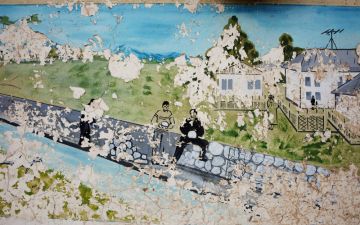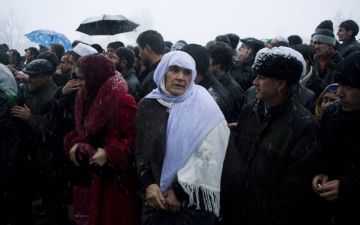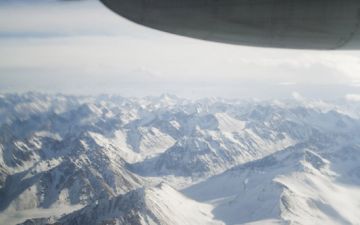Tajikistan
Return to Dushanbe
More press credential-less street interviews and meetings today including an off the record interview with the US ambassador. In the evening I went to a nightclub, a tawdry disco filled a few wealthy Tajik men and Russians of both genders –including Russian soldiers from the Russian base outside Dushanbe. I'm caught filming the dance floor and promptly escorted to the front door bouncer, who is approximately the size of a mid-sized sedan. The bouncer tells me to delete my camera. I make a show of touching a few buttons and the bouncer is satisfied.
Central Asia's Cold War Over Heat
"This is why we have no electricity, no water," says Alovutdin Sololiev, waving at the broken-down traffic lights as he speeds into a major intersection, asserting a right of way not recognised by other drivers. His gesture extends from the dead signals to the belching little gas generators with rubber hoses, which colonise the pavements like a maze of octopuses stranded on cement. "Nobody wants to stop and figure out rules."
Khojand continued...
For reasons never explained to me, the city of Khojand has an unusual number of non-governmental organizations. Before flying back to Dushanbe this evening, I meet with a couple of them.
Taboshar
Another day, another fiasco.
Carolyn and I, along with a translator and a driver head to villages outside Khojand. We get an early start and drive for about an hour to a town called Taboshar, where a uranium mine was active during Soviet times but has been dormant since Tajikistan's independence. Most of the Russians and Ukrainians who once lived in Taboshar have emigrated, leaving behind the many stately stone houses originally built by German prisoners from WWII.
Can Tajikistan Weather the Storm?
The spreading global financial crisis has raised the specter of widespread upheaval in this small but strategically important mountainous former Soviet nation straddling Afghanistan's jagged northern border.
"The crisis is the start of a catastrophe," said Saifullo Ergashev, executive director of the Human Rights Center here. Tajikistan was devastated by food and energy shortages last year due to unusually cold winter conditions, and experienced severe energy and water shortages again this winter.
Tajikistan: Khojand
Our tickets were booked for the 11am flight to Khojand, not 2pm as we asked for and were told was our departure time. The woman at the airline service desk told us we were out of luck, everything was booked solid for the day -- but a porter took us aside and offered to fix things. He took us to a different counter and within about fifteen minutes he handed us tickets for the 11am flight. After going through security –which consisted of a broken metal detector-- the porter asked for 100 somoni, about $35. A bit exorbitant but I didn't have the energy to argue.
Tajikistan: Freedom to Farm
This morning I met with Tajiks involved in agricultural development. A big government reform is in place that could have a huge impact on Tajikistan's agriculture. Farmers now have the right, in theory, to choose what to grow. The reform is called "Freedom to Farm."
Near The Afghan Border
Today was a fiasco.
Having cooled our heels all morning waiting for press accreditation badges, Carolyn and I finally hit the road. We are both eager to check out the isolated farming communities lining Tajikistan's border with Afghanistan.
Will the Economic Crisis Destabilize Tajikistan?
Taking a car from Dushanbe, Tajikistan's easy-going capital city, to the Afghanistan border requires special permission from government authorities. I didn't have it.
Tajikistan: Dushanbe #2
Central Asia is not a beacon for press freedom. But government attitudes are generally calibrated by the language a journalist writes or broadcasts. National languages –Tajik, Kazakh, Uzbek, Kyrgyz, or Turkmen-- are the most sensitive and tightly controlled. Russian, the lingua franca of post-Soviet Central Asia, comes a close second. English is not such a big deal since very few Central Asians can understand it and Central Asian regimes care most about controlling the information actually consumed by their citizens.
Tajikistan: Dushanbe
On the Turkish Airlines flight into Dushanbe, the young American woman sitting next to me was enthusiastic about her next three days of personal freedom in Tajikistan. She is a political officer at the US embassy in Afghanistan. "I'm looking forward to being able to walk around on streets," she told me in a slight southern twang. "It will feel good to be in a normal city."
